

Great Britain’s Minister of Sports, Tracey Crouch, says doping won’t be made a criminal offense.
“It was right we looked into criminalizing doping. However the strong consensus is that it would not necessarily aid the fight”, Crouch told the BBC.
However, Crouch has recommended an “increased anti-doping measures and more random testing and improved education into drugs.”
Crouch’s report, which comprised extensive interviews with sports bodies and anti-doping organizations such as UK Anti-Doping (UKAD) and the World Anti-Doping Agency (WADA), concluded the Great Britain “has an appropriate regulatory framework to tackle doping.”
Indeed, none of those interviewed for the report supported the criminalization of doping, suggesting their investigations into wrongdoing would be slowed down if it was.
In addition, the report concluded that long-term bans are the most effective way of tackling doping in sport – for both the athletes and those involved in doping – as it led to loss of earnings. Furthermore, the report suggests that UKAD should have better access to sports events and bodies for more random testing.
While UKAD currently does have access to major sporting events, most event organizers warn athletes they may be tested beforehand.
The report found doping officials can encounter resistance, especially at football training grounds and events like Wimbledon, where UKAD is not the contracted testers.
“Great Britain is one of the leading nations in the world in anti-doping with robust testing, information sharing and investigation processes in place,” Crouch added.
“We are not complacent though, which is why there are recommendations in the review that I urge the anti-doping authorities, sports governing bodies and health organizations to consider to further strengthen our approach.”
Additionally, the report also addressed the review of therapeutic use exemptions (TUEs).
A TUE allows an athlete, for medical reasons, to take a prescribed substance or have treatment that is otherwise prohibited.
Athletes must contact their national governing body before applying for a TUE, but Crouch called for a review of thresholds in the personal use of banned substances.
Britain’s most decorated Olympian and asthma sufferer Bradley Wiggins had TUEs for a banned steroid before competitions.
Wiggins came under scrutiny after his confidential medical information was leaked by hackers ‘Fancy Bears’ in September 2016.



